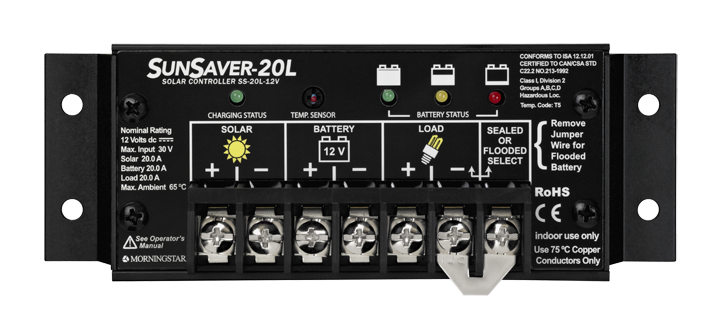
Features:
• 100% solid state
• Fully encapsulated in epoxy potting
• Marine rated terminals/anodized case
• Series design (not shunt)
• True 0 to 100% PWM duty cycle
• Setpoint accuracy to 12V: +/- 25mV, 24V: +/- 48mV
• Rated for 25% overloads
• Temperature compensation
• Sealed/Flooded battery select
• No need to derate
• Parallel for 40 amps or more
• Green charging/Red LVD indicators
• Weight is 8 oz (0.23 kg)
Electrical Specifications:
Model SS-20L-12V SS-20L-24V
Max Solar Current 20 Amps 20 Amps
Max Load Current 20 Amps 20 Amps
Regulation Voltage:
Sealed 14.1 Volts 28.2 Volts
Flooded 14.4 Volts 28.8 Volts
Load Disconnect 11.5 Volts 23.0 Volts
LVD Reconnect 12.6 Volts 25.2 Volts
Max PV Volts 25 Volts 44 Volts
Self Consumption 6 to 10 mA
Operating Temperature -40 to +60 C.
Wire size #10 AWG
Notes:
- 100% Solid State: All power switching is done with FETs. No mechanical relays are used in the controller.
- Battery Charge Regulation: Uses an advanced series PWM charge control for constant voltage battery charging. A true 0 to 100% PWM duty cycle is very fast and stable for positive charge control under all system conditions.
- Temperature Compensation: A sensor next to the green LED measures ambient temperature conditions. Corrects the constant voltage setpoint –28 (–56 for 24V) mV per °C with a 25°C reference. This correction matches the battery charging to the changing electrochemical properties of the battery, and works best if the battery and controller are in a similar thermal environment.
- Sealed / Flooded Select: Flooded batteries require more vigorous charging to avoid stratification, and sealed batteries require precise control to avoid outgassing. Constant voltage setpoints are 14.4 (or 28.8) volts for flooded batteries, and 14.1 (or 28.2) volts for sealed batteries.
- Low Voltage Disconnect (LVD): The automatic load disconnect is an option. If the battery falls below 11.5 (or 23.0) volts, the load is disconnected from the battery to protect against harmful deep discharges. A 2-second delay prevents load disconnects from transients. The load is automatically reconnected when the battery voltage recovers to 12.6 (or 25.2) volts.
- Battery Disconnect: If the battery is disconnected during the daytime, the PV array will continue to provide power to the controller. Will immediately go into PWM and provide power at a constant voltage to the load. This may continue as long as power is available from the PV array.
- Parallel Controllers: Work very well in parallel configurations. No blocking diodes are required. The only constraint is that each controller must have an independent and separate PV subarray and load. Make sure that each controllers rating for PV and load current is not exceeded.
- Auxiliary Generators: Engine generators and other sources of power may be connected directly to the battery for charging. It is not necessary to disconnect the controller from the battery. However, do not use the controller to regulate these other generators.
- Reverse Current: Prevents the battery from discharging through the PV array at night. There is no need to install a blocking diode for this purpose.
- Noise: The controllers circuit minimizes switching noise and filters all noise output to extremely low levels when the system is properly grounded. If noise is present in a telecom load, it is most likely a grounding problem in the system.
$95 POSTPAID TO USA.
$95 TO OTHER COUNTRIES WORLDWIDE ONLY IF ORDERED WITH A PUMP.